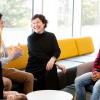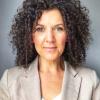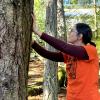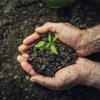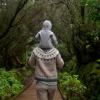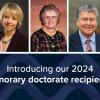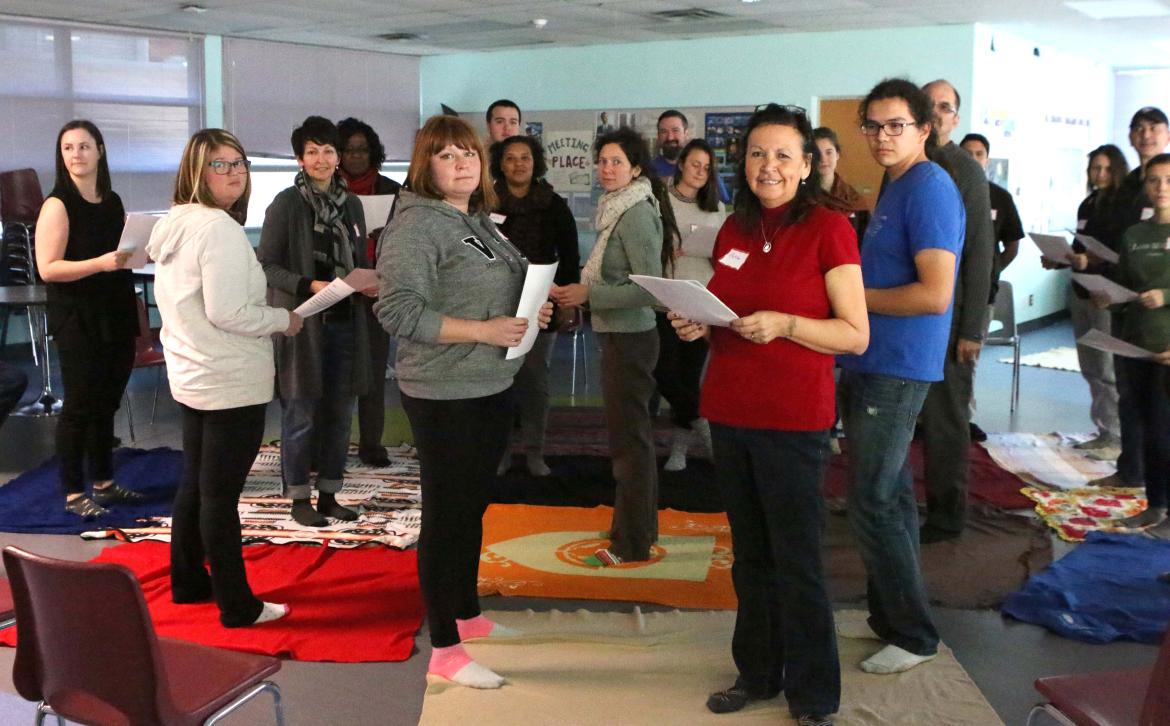
Sylvia Scow, front, Aboriginal Projects Coordinator and Elder Support, facilitates the KAIROS Blanket Exercise – one of numerous educational sessions VIU offers free to anyone in the community who wants to participate.
December 21, 2017 - 9:45am
Organized by the Office of Aboriginal Education and Engagement, the free sessions are open to community
A unique learning series designed by Vancouver Island University’s (VIU’s) Office of Aboriginal Education and Engagement invites community to join the conversation about reconciliation.
The Na’tsa’ maht Shqwaluwun: One Heart, One Mind learning series includes a range of half-day, full-day and multiple-day education sessions taking place throughout the school year that are free and open to all interested faculty, staff, students and community members.
From learning the importance of protocol for local First Nations communities, to a deeper discussion about reconciliation, to an Indigenous Book Circle, the series offers people a variety of ways to learn more about Indigenous perspectives – and engage with others.
“They offer different points of entry for people to come and have a conversation,” says Dr. Sharon Hobenshield, VIU’s Director of Aboriginal Education and Engagement.
“The One Heart, One Mind series is an opportunity to build relationships, which is at the heart of what reconciliation is all about.”
The series launched on October 27 with a Coast Salish Protocol Session, which is offered again in January. Other events in the series include a four-part Conversations Toward Reconciliation dialogue; Indigenous Book Circles; the Soup & Bannock Lunch & Learn Series that invites a different presenter to speak every month over the lunch hour; and the KAIROS Blanket Exercise, a two-hour interactive exercise that walks participants through the history of treaty-making, colonization and resistance that resulted in the nation we today call Canada.
“These sessions continue the conversations toward reconciliation,” says Sylvia Scow, Aboriginal Projects Coordinator and Elder Support. “We learn from the Elders, then bring in the students doing that work to showcase their skills, ability and potential. It’s a different way of being together through sharing and learning.”
Howard Houle, a community member and Electoral Area B Director with the Regional District of Nanaimo, has participated in several of the educational sessions, including the Blanket Exercise.
“The part that had the biggest impact on me was the people who were there and the sharing of their stories,” he says, of participating in the Blanket Exercise. “It really brought the point of everything forward, when you hear other people’s stories and what their issues were with what happened.”
Houle said the conversations stimulated by the different sessions he attended opened participants up to new perspectives and helped them gain a better understanding of the issues facing First Nations people today, such as the effect colonization had on the culture of many communities.
“It was eye-opening for a lot of people who participated,” says Houle.
“A number of doors opened to participants that they’ve never seen before and it’s up to them to really explore what that means.”
Third-year Child and Youth Care student Aaron Moore, a member of the ‘Su’luqw’a’ Community Cousins Aboriginal Mentorship Program with ties to Penelakut Tribe and Finnish and Danish roots, found the Blanket Exercise eye-opening.
“It’s almost wrenching at first – it’s a first-person look at colonization that really puts it into perspective for you,” says Moore, who is now facilitating the Blanket Exercise. “Participating has real-world applications in terms of being a better citizen of Canada and learning about something I don’t feel we’ve had a true connection to. It opens up constructive thoughts about what it means to be an Indigenous person these days.”
VIU English Professor Dawn Thompson, who has taken many of the workshops, calls the educational sessions a “gift, both to employees of the university and to the Nanaimo community as a whole.”
“They are an opportunity to listen, learn, and expand one’s mind and heart. The presence of local Elders brings guidance and wisdom, and the participation of Indigenous students allows their voices to be heard in a way that would not generally happen in a classroom.”
To learn more about Indigenous education initiatives at VIU, visit aboriginal.viu.ca.
-30-
MEDIA CONTACT:
Jenn McGarrigle, Communications Officer, Vancouver Island University
P: 250.740.6559 | C: 250.619.6860 | E: Jenn.McGarrigle@viu.ca | T: @VIUNews
Tags: Aboriginal | Community Cousins | Indigenous | Teaching and Learning

